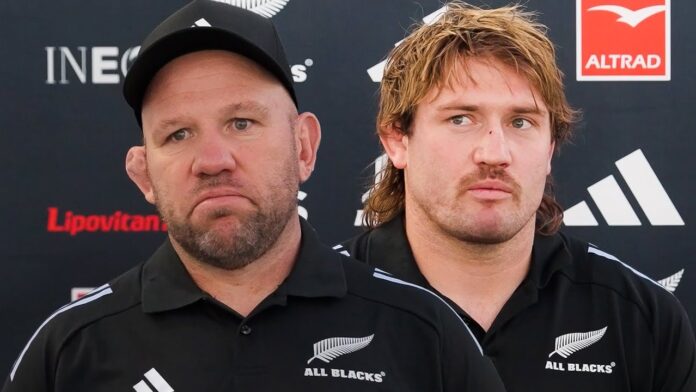South African Rugby Union issued an apology to New Zealand after music, fireworks, and a flyover interrupted the blacks’ haka before their rugby championship clash in Johannesburg.
The South Africa Rugby Union has formally apologized to the New Zealand Rugby Football Union (NZRFU) following an unintentional disruption during the All Blacks’ haka ahead of their Rugby Championship match against the Springboks in Johannesburg. The iconic haka, a traditional Māori war dance performed before every All Blacks game, was interrupted by an unexpected overlay of music, fireworks, and a flyover by an A380 airline at Emirates Airline Park.
According to SA Rugby’s chief executive, Rian Oberholzer, the disruption occurred due to “timekeeping challenges” and “simple human error.” In the excitement of the moment, the crowd’s cheering was mistakenly interpreted as the conclusion of the haka, leading a sound engineer to resume the music program prematurely. Oberholzer expressed deep regret over the incident, emphasizing that it was not a deliberate act of disrespect toward the New Zealand team or the haka tradition.
“I personally apologized to the NZRFU and have sent a formal letter to express our sincere regret,” said Oberholzer. “It was never our intention to schedule any activities that would coincide with such an iconic moment of any Test match against the All Blacks.”
The disruption overshadowed what was otherwise a thrilling match, where South Africa staged a remarkable comeback to secure a 31-27 victory, their third consecutive win in the Rugby Championship. Scrum-half TJ Perenara led the All Blacks in the haka, and the South African crowd, traditionally expected to remain silent, had been eagerly watching. However, the untimely interruption marred the moment, leading to widespread criticism from rugby fans and commentators alike.
As the Springboks prepare to face New Zealand again on Saturday at DHL Stadium in Cape Town, SA Rugby hopes that the incident will not detract from the respect and rivalry that defines the matches between these two rugby powerhouses. The organization is taking steps to ensure that such a disruption does not happen again, reaffirming its commitment to upholding the traditions and spirit of the game.
Analysis:
Political: The disruption of the haka before such a significant match holds implications beyond the rugby field, as it touches on the broader political and cultural relationship between South Africa and New Zealand. The haka is not just a pre-match ritual; it is a profound expression of Māori culture and identity, which has been respected by sports teams worldwide. The incident, though unintentional, may strain diplomatic relations between the rugby unions of both nations. However, SA Rugby’s prompt and sincere apology is likely to mitigate any potential fallout. This event serves as a reminder of the delicate balance required when navigating cultural traditions in international sports.
Social: Socially, the incident highlights the importance of cultural sensitivity in global sports. The haka is a symbol of New Zealand’s heritage and a source of national pride. Its interruption, even accidentally, can be seen as a lack of respect for the cultural significance it holds. This incident has sparked conversations about how sports organizations handle cultural expressions and the need for heightened awareness in such situations. The event also underscores the power of sports in uniting people across cultures and the responsibility that comes with hosting international events.
Racial: From a racial perspective, the disruption of the haka touches on the broader issue of how indigenous cultures are respected and represented on global platforms. The haka is a key part of Māori culture, and its respectful performance is crucial in honouring the Māori people. Any interruption, particularly during such a high-profile event, can be perceived as a slight against the Indigenous community. The incident underscores the ongoing challenges in ensuring that indigenous cultures are not only represented but also respected in international settings. SA Rugby’s apology acknowledges this and emphasizes its commitment to honouring all cultural traditions in rugby.
Gender: While the incident primarily revolves around cultural respect, it also subtly intersects with gender dynamics in the realm of sports. Rugby, traditionally seen as a male-dominated sport, has been gradually embracing more inclusivity and diversity. The haka, while rooted in Māori warrior traditions, has evolved to include women’s teams as well, showcasing its adaptability and enduring significance. Ensuring that such traditions are respected across all levels of the sport, regardless of gender, is crucial in promoting a more inclusive and respectful sporting environment.
Economical: Economically, the incident could have implications for SA Rugby, particularly in terms of their reputation and the commercial relationships that are integral to international sports events. The disruption might affect fan sentiment, which in turn could influence ticket sales, merchandise, and viewership for future matches. Moreover, as sports events are increasingly intertwined with sponsorship deals and broadcasting rights, maintaining a respectful and smoothly run event is essential for sustaining financial support from stakeholders. SA Rugby’s quick response to the incident is likely aimed at preserving these economic interests while also upholding the integrity of the sport.
